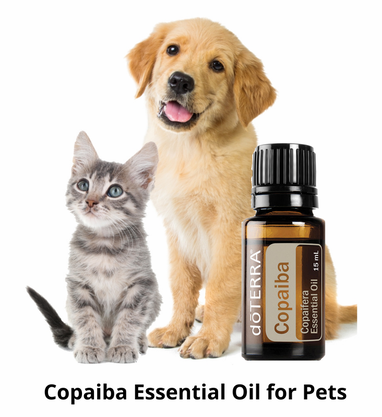|
What Is Copaiba Oil?
The Copaiba is a large towering tree that grows in tropical rainforests of South America. For hundreds of years, traditional healers in northern Brazil have used copaiba trees for their health benefits. Copaiba oil is steam distilled from the resin of the tree. What Is Copaiba Oil Used For? Copaiba oil supports the health of the cardiovascular, nervous, digestive, immune, and respiratory systems.* Copaiba Essential Oil along with Turmeric Essential Oil can be great for assistance with inflammation which is a big cause of arthritis and other mobility issues for our dogs. Contact me for more information on using Copaiba with your pets. doTERRA Copaiba oil is sourced in Brazil from four species of Copaiba. By harnessing the benefits of the most potent copaiba species, a maximum potency essential oil is obtained. With a pleasant, spicy, and woody aroma, Copaiba oil can help calm emotions and soothe anxious feelings. It is a wonderful oil to turn to at the end of a stressful day. My dogs love Copaiba and I am sure feel the calming benefits. Can Copaiba Oil Be Taken Internally? Copaiba oil also has a plethora of benefits when taken internally. The main constituent of Copaiba oil is Beta-caryophyllene, which is also present in Black Pepper essential oil and helps soothe anxious feelings.* In addition to its emotional benefits, Beta-caryophyllene promotes healthy nervous, cardiovascular, and immune system function.* The oil also contains powerful antioxidants that boost immune health.* Copaiba oil is a well-loved oil because it relieves discomfort and promotes overall health, supporting people to feel and live their best. Diffusing or inhaling Copaiba oil is deeply relaxing and soothing. Add a few drops to a diffuser for emotional support. For increased cellular support, take internally alone or with Frankincense.* For digestive support at mealtimes, take with Peppermint.* * These statements have not been evaluated by the Food and Drug Administration. This product is not intended to diagnose, treat, cure, or prevent any disease. CBD Oil vs. Copaiba Oil https://www.doterra.com/US/en/everything-you-need-to-know-about-cbd
0 Comments
Don't forget all the things associated with Easter that are harmful to your pets! Pet proof your home to have a safe Easter weekend with your pets. Especially in households with younger children, it is very import to pet-proof your house for Easter festivities! Between sneaking chocolate from baskets, eating candy wrappers strewn across the house, and mistaking fake, plastic grass for the real deal... Easter weekend is an ingestion hazard waiting to happen.
The best place to start is by avoiding all fake, plastic Easter-basket-grass as it can be lethal when consumed by an unsuspecting pet (not to mention it's very hard to recycle!). Here are some favorite go-to replacements are:
As with all holidays, I always recommend pet-proofing your GUESTS as well as your house to avoid incidents and to reduce the stress on your pets. Especially with less-frequent guests, give visitors a quick run-down of your pet-rules-of-the-house - i.e. keeping outside doors closed, not feeding the pups from the table, don't chase or handle the animals, unless advised how to. However, in any situation with many visitors to your home, your pets will inevitably have heightened anxiety and stress. In these situations I've found two products to be incredibly effective in keeping my pets happy and relaxed - Diffusing doTERRA Essential Oils and playing calming music. They can both calm your pets! March is Poison Awareness Month so let's be cautious with our pets!
Are you aware of all the poisonous plants to your pets that are in your surroundings and food? Created by Proflowers. Let's talk about cats!
With cats... ultimately, you will hear many things from many people about cats and oils. Here's my take: Cats lack an enzyme called glucuronyl transferase. This is important for the Cytochrome p450 liver metabolism pathway. This makes cats very susceptible to ALL kinds of toxicity, including plant, NSAIDS (like aspirin, ibuprofen and Tylenol), chocolate and caffeine (methylxanthines), lead, zinc, and many, many types of pesticides. So which oils do you stay away from? Most certified pure essential oils are so pure that you can use them topically on cats sporadically in a highly diluted form (as if for infants). It's not a good idea to use them topically or internally on your cat every single day (with the exception of helichrysum, lavender and Frankincense). The oils to stay away from and use something different if you can are the oils that are high in phenols and eugenols as far as direct application (topical or internal) to your cat (the oils high in phenols are basil, birch, cinnamon, clove, fennel, melaleuca, oregano, peppermint, thyme, and wintergreen.) As far as diffusion - I diffuse everything! I just make sure not to diffuse anything in my kitty's room (where her food and litterbox are) and make sure she's not "locked" in the room with the diffuser - she will go away if it's one she doesn't like or need. The main thing is, don't give oils to cats topically or internally every day (with some exceptions), dilute them, only use certified pure essential oils, and when in doubt, feel free to ask! |
Blog CreatorMary DeRoche Archives
April 2024
Categories
All
|
DISCLAIMER: I, Mary DeRoche, am not a veterinarian and do not practice medicine. I do not diagnose, cure, heal, treat disease or otherwise prescribe medication. I assist people in working with their animals in correcting energetic imbalances in their pet’s bio-field that assists the body to release its innate healing ability. When the energy chi of the body is balanced and moving correctly, the body’s innate natural energy heals itself. All healing is self-healing. Animals are affected by their environment so I also include the pet parents in my work. Animals do pick up energy from their family and environment. I only recommend the use of therapeutic grade essential oils for your pets because therapeutic grade essential oils have been tested to guarantee that they are free of synthetics, additives, toxins and any other impurities, which can result in side effects and/or inconsistent results. Essential oils and supplements are recommendations to help boost the pet’s immune system.
I recommend that clients continue to see their pet’s regular veterinarian and follow their advice and my work is a complement to regular allopathic medicine. My spiritual energy work is not a substitute for conventional medical diagnosis or treatment for any medical or psychological condition. For such issues, you should seek the proper licensed veterinarian. I am a Healing Touch for Animals Practitioner and a Subtle Energy Practitioner and my work is spiritually and energetically based and I believe all healing is spiritual in nature. I do not make any promises, warranties or guarantees about results of my work, or of the energy sessions. The energy sessions help many animals but like any energy work, it might not work for everyone. The use of essential oils, herbs and supplements is to assist the pet with balancing chakra centers for proper energy flow or chi.
© 2013~2023 Pawsitive Wellness Center All Rights Reserved.
I recommend that clients continue to see their pet’s regular veterinarian and follow their advice and my work is a complement to regular allopathic medicine. My spiritual energy work is not a substitute for conventional medical diagnosis or treatment for any medical or psychological condition. For such issues, you should seek the proper licensed veterinarian. I am a Healing Touch for Animals Practitioner and a Subtle Energy Practitioner and my work is spiritually and energetically based and I believe all healing is spiritual in nature. I do not make any promises, warranties or guarantees about results of my work, or of the energy sessions. The energy sessions help many animals but like any energy work, it might not work for everyone. The use of essential oils, herbs and supplements is to assist the pet with balancing chakra centers for proper energy flow or chi.
© 2013~2023 Pawsitive Wellness Center All Rights Reserved.




 RSS Feed
RSS Feed